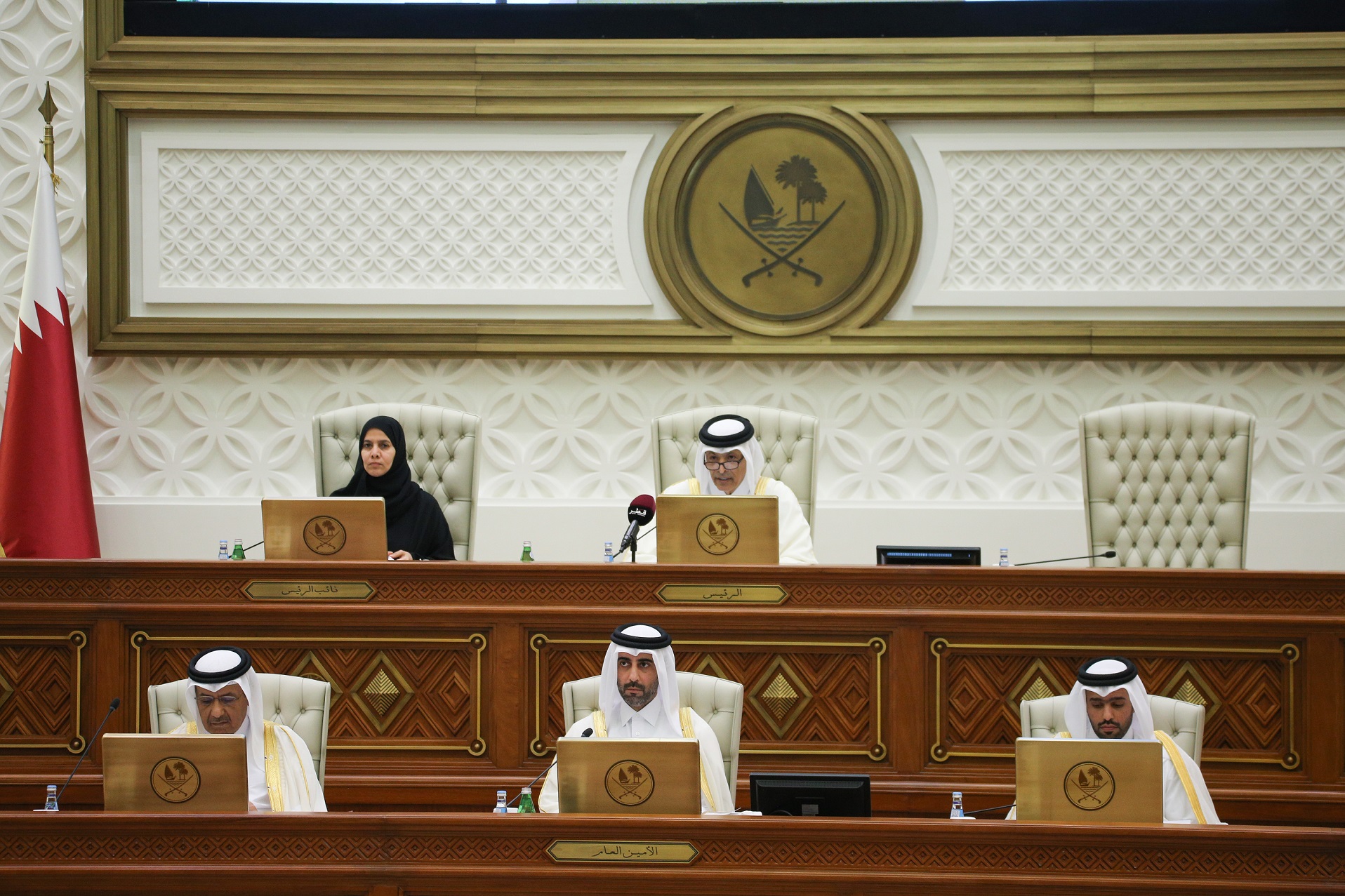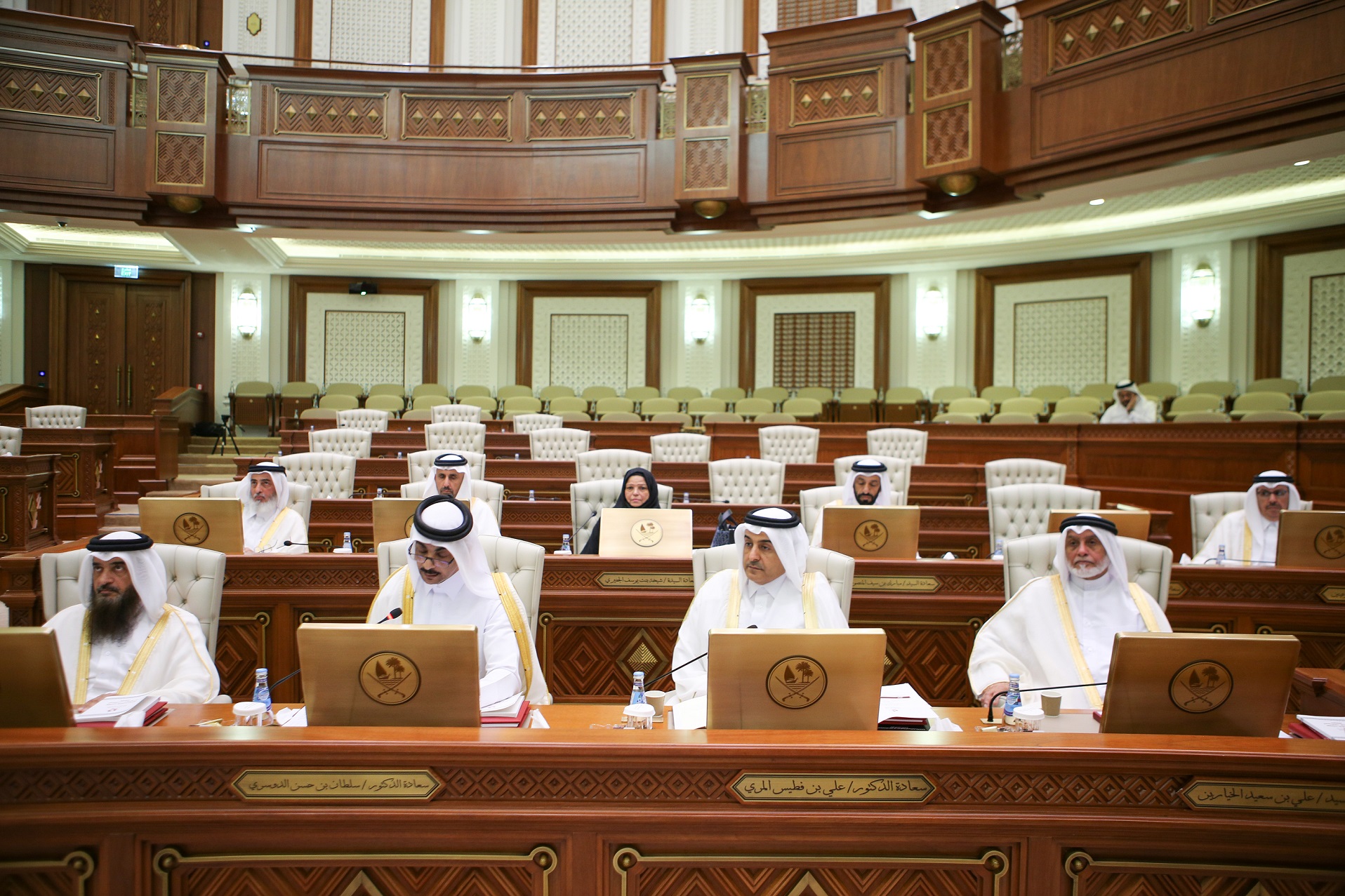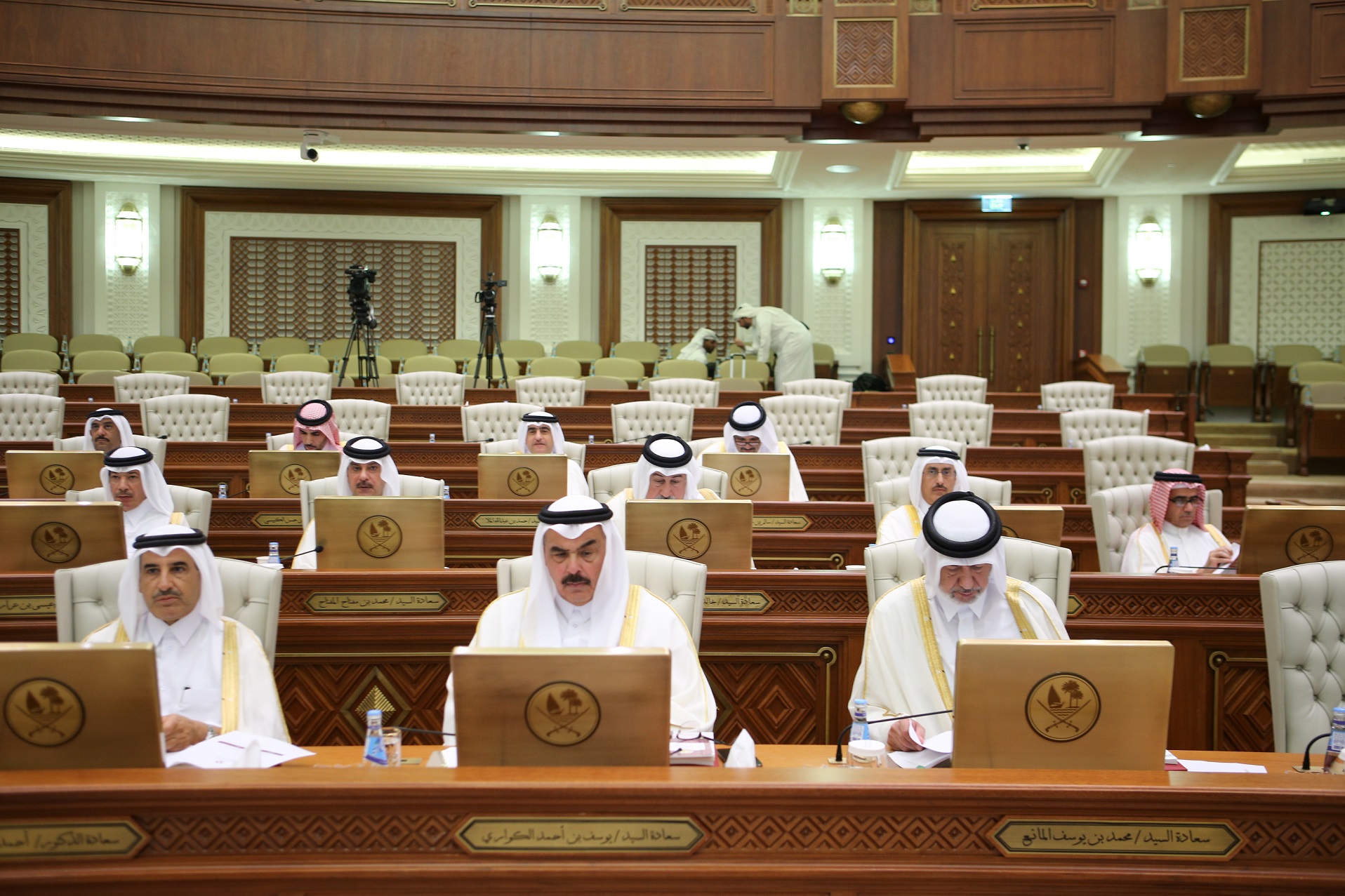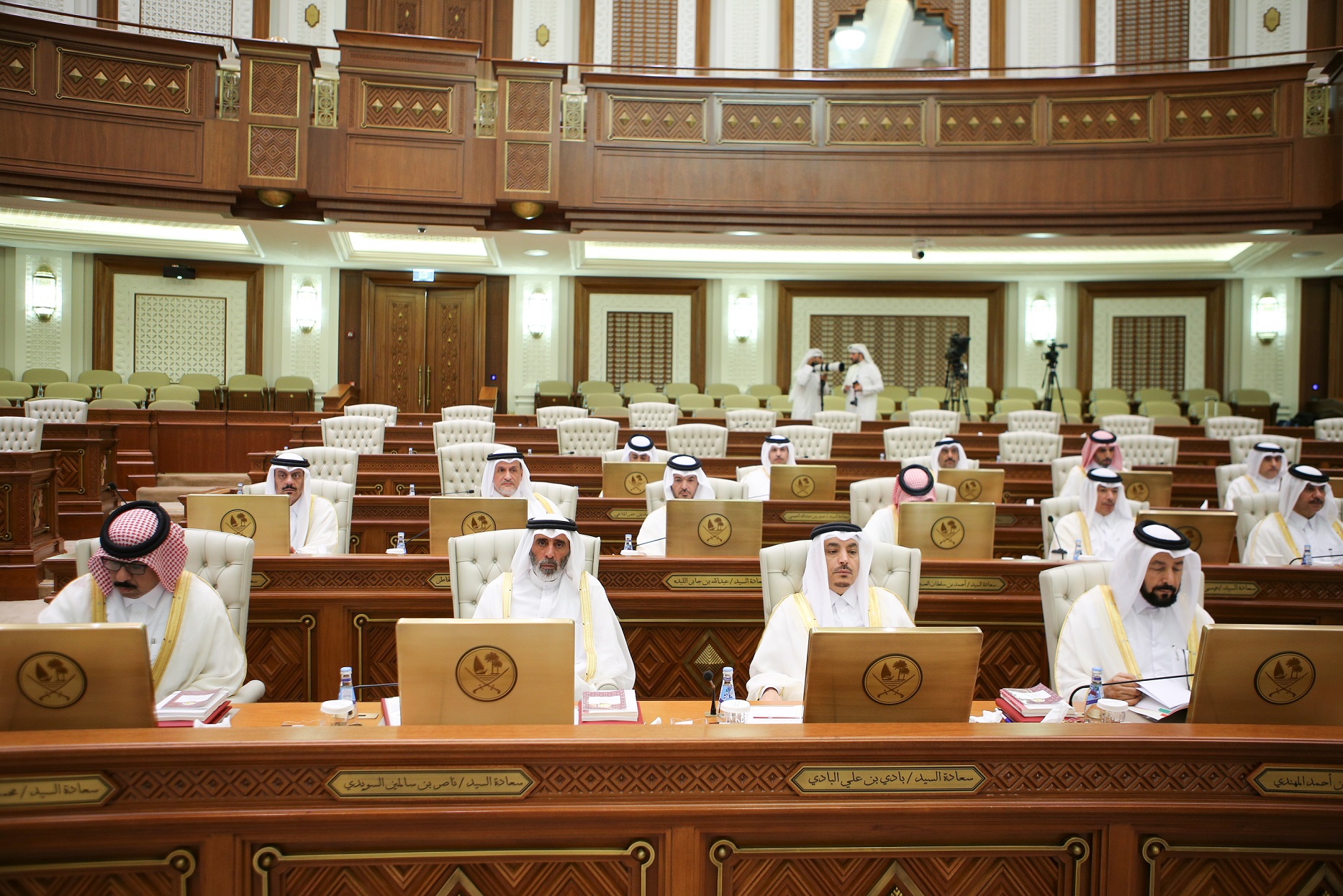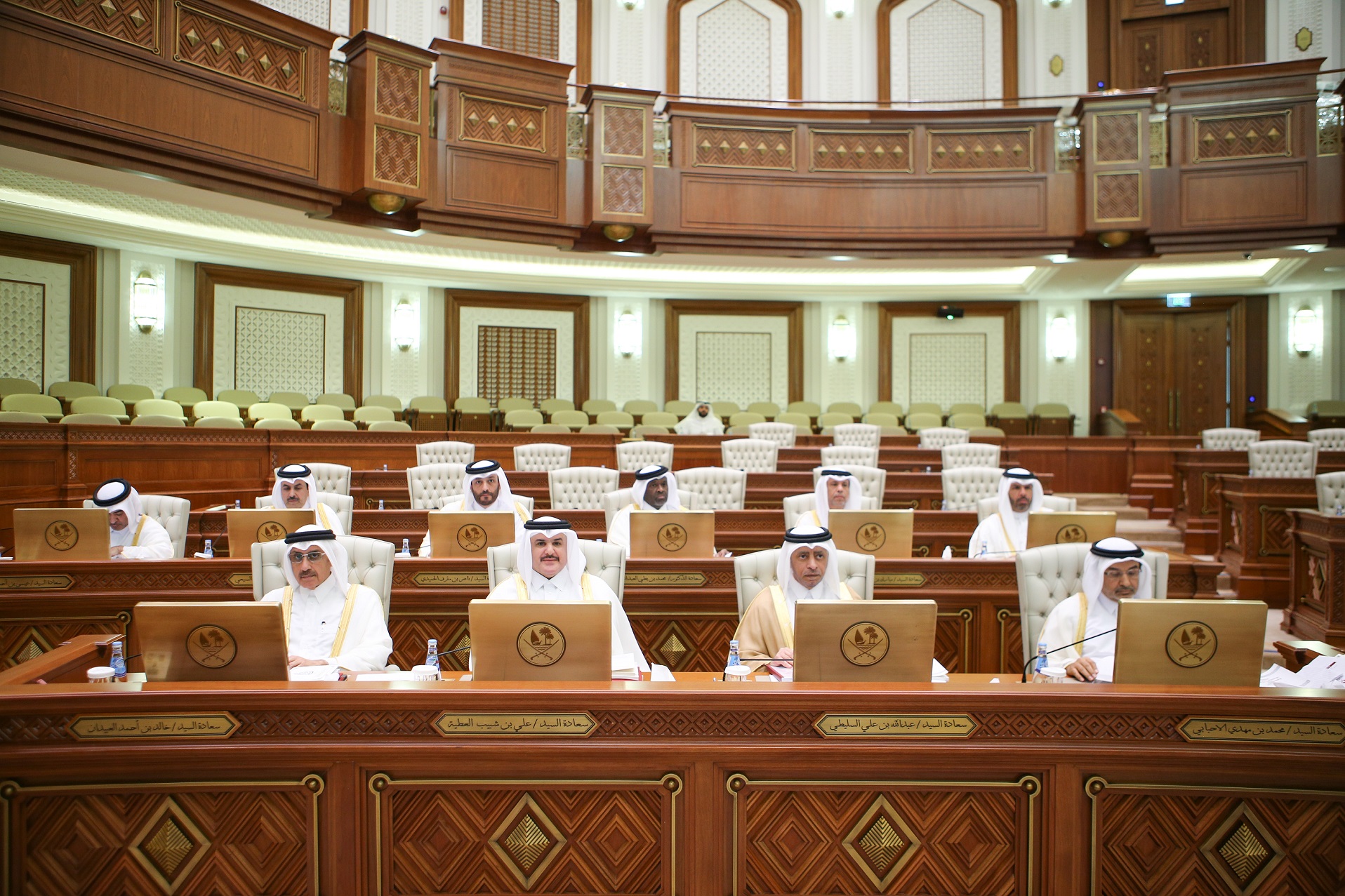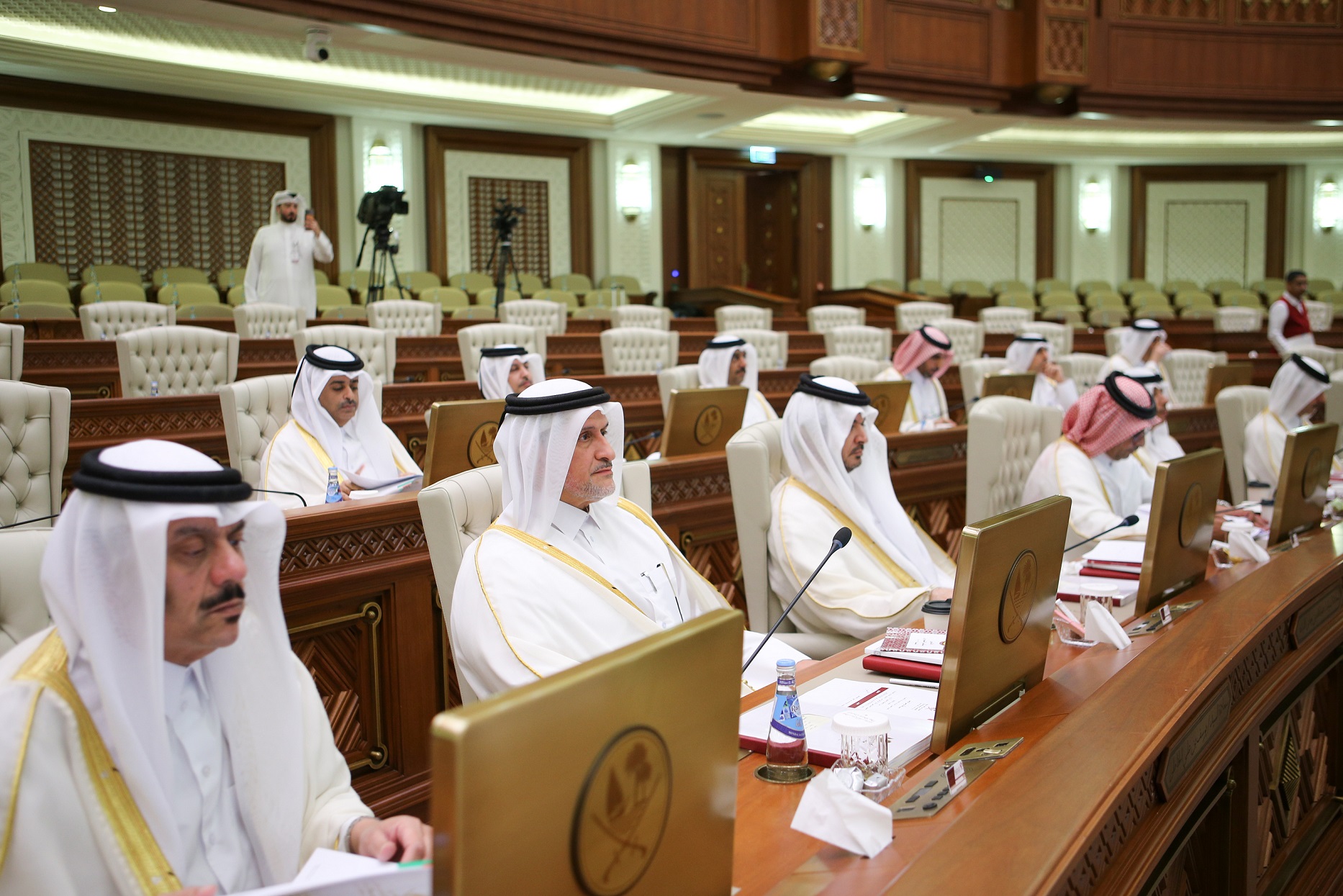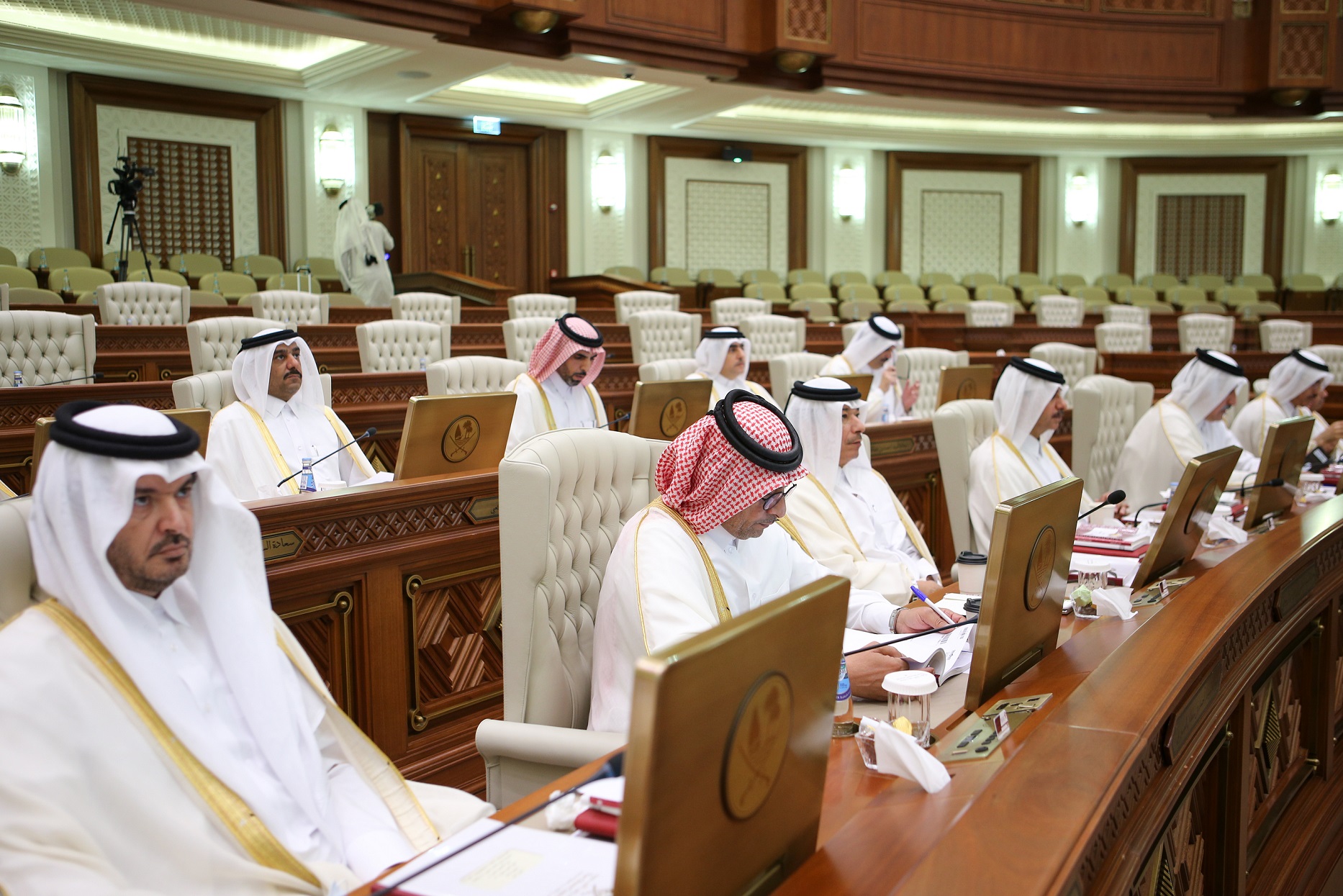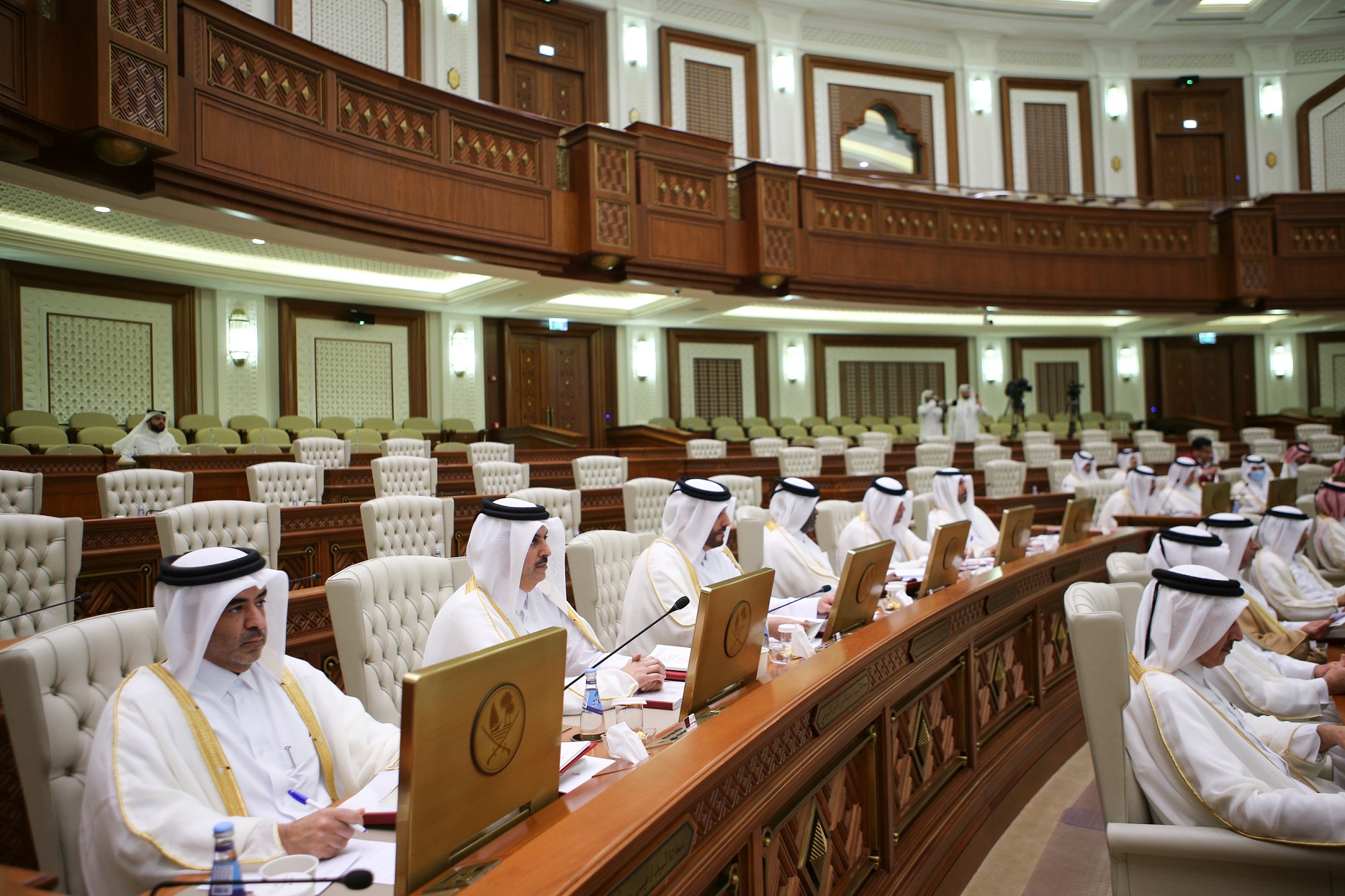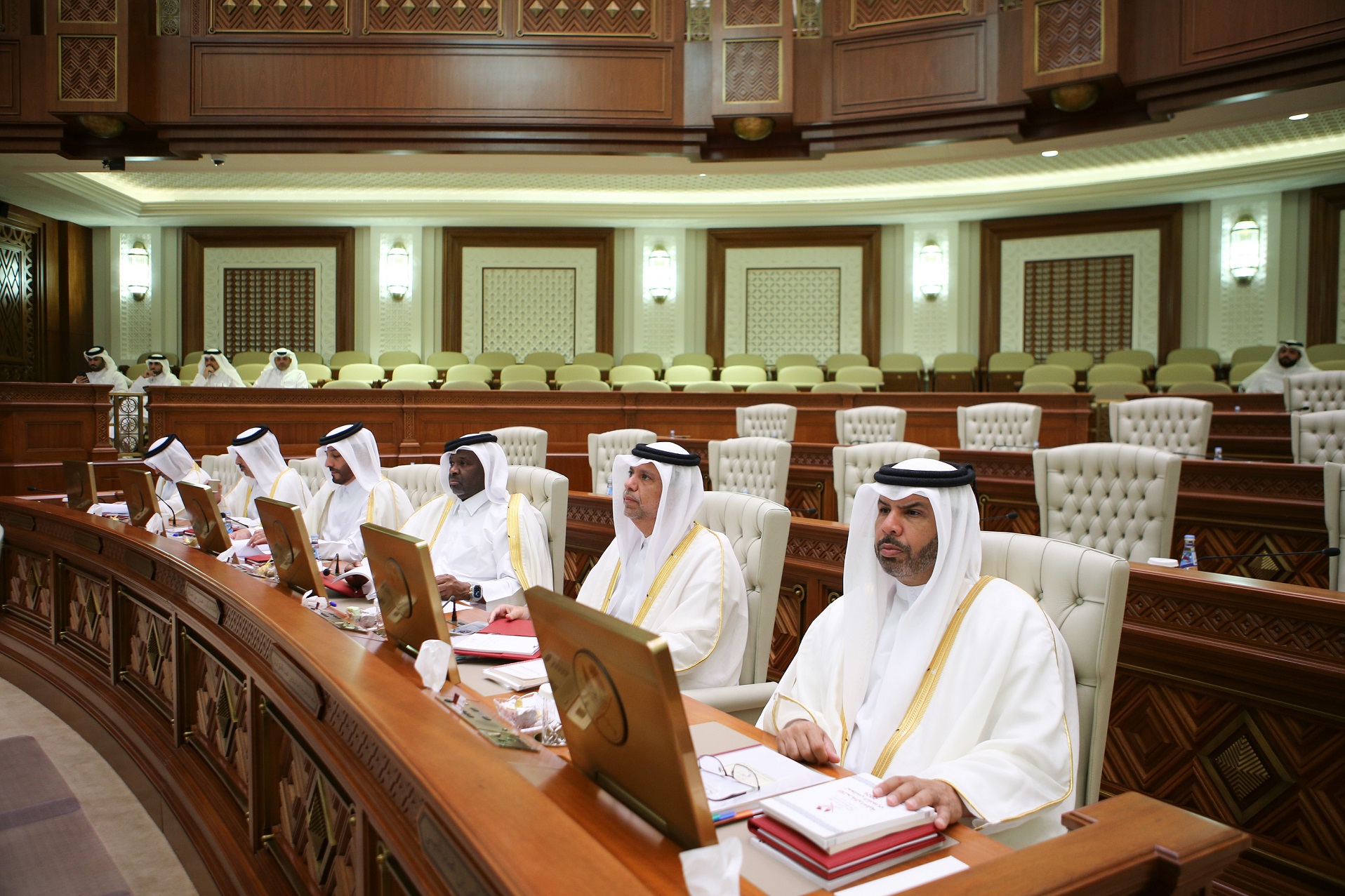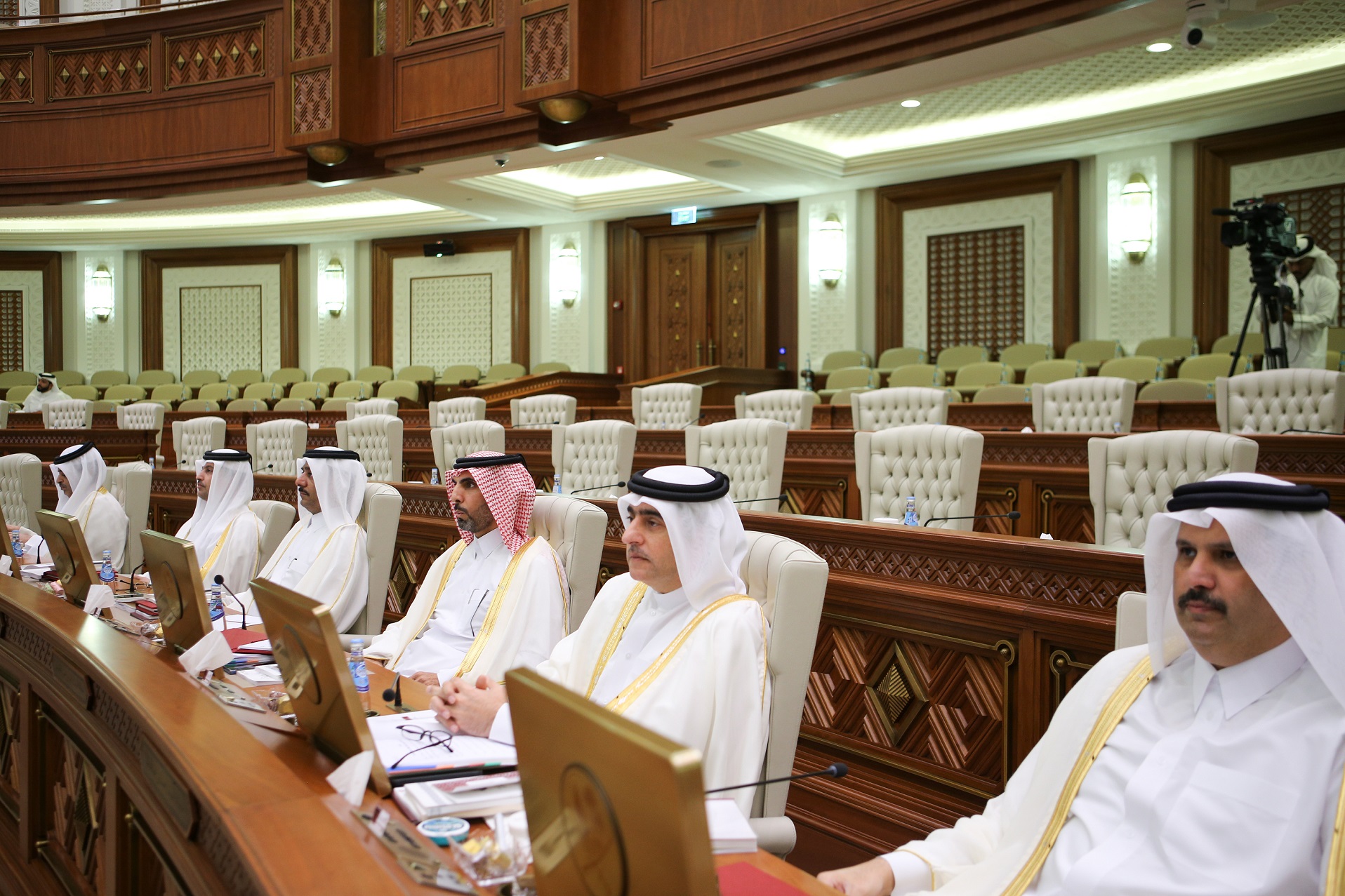Shura Council Holds Weekly Meeting, Approves Draft Constitutional Amendments
28 October 2024
The Shura Council held its regular weekly session today, for the fourth ordinary session of the first legislative term, corresponding to the 53rd annual session, in the Tamim Bin Hamad Hall at the Council's headquarters, chaired by HE Speaker of the Council Hassan bin Abdullah Al Ghanim.
At the beginning of the session, the Shura Council praised the European tour of HH the Amir Sheikh Tamim bin Hamad Al-Thani which included the Italian Republic and the Federal Republic of Germany. The Council pointed out that the state visit to Italy and the official visit to Germany reflect Qatar's commitment to enhancing bilateral relations and strategic partnerships with those countries.
The Council confirmed that these visits open new horizons for cooperation in the fields of economy, education, innovation, and the promotion of stability and peace on both regional and international levels. The Council added that the tour of His Highness comes at a crucial time to enhance dialogue and understanding on global common issues, such as sustainable development and international security, thus reinforcing Qatar's role in achieving international peace and stability.
Following this, HE Secretary-General of the Shura Council Nayef bin Mohammed Al Mahmoud read out the agenda, and the minutes of the previous session were approved.
During the session, the Shura Council unanimously approved the draft constitutional amendments after reviewing the report of the special committee studying the amendment of some articles of the constitution. Constructive and in-depth discussions took place, with the esteemed members of the Shura Council showing great commitment for enhancing national unity, upholding the principle of justice and the rule of law, and ensuring the countrys supreme interest in accordance with the directives of HH the Amir.
On this occasion, HE Speaker of the Shura Council Hassan bin Abdullah Al Ghanim extended his heartfelt thanks and gratitude to HH the Amir Sheikh Tamim bin Hamad Al-Thani for his wise directives and insightful vision, which he expressed in his historic speech at the opening of the fourth session of the first legislative term. This speech laid out a comprehensive plan to enhance Qatar's development and prosperity.
HE the Speaker emphasized in his speech that the draft constitutional amendments, which were proposed based on the directives of His Highness, places the country at a crucial moment that will advance it and open doors for growth, progress, and prosperity, which future generations will remember with pride and honor.
His Excellency added that these amendments represent an important step in strengthening national unity and upholding the rule of law. His Excellency added that the purpose of proposing these constitutional amendments, as indicated by His Highness in his speech to the Shura Council, is to preserve the unity of the people and enhance equal citizenship in terms of rights and duties.
HE the Speaker stressed that these amendments reflect the State of Qatar's commitment to applying the principle of justice and the rule of law in all areas of life, fulfilling the aspirations of Qatari citizens for a better future governed by law.
His Excellency added that the approval of these amendments and the noble goals they aim to achieve mark historic moments in the development and growth of Qatar, highlighted the its security and social cohesion, stressing that the goal now is to bolster that unity even further for future generations.
HE the Speaker reaffirmed that the Shura Council, which has paid great attention to studying these amendments under the wise leadership's guidance, pledged to HH the Amir and the Qatari people to continue performing its national duties with full responsibility and sincerity, aiming to strengthen national unity and consolidate the pillars of the state, based on justice and the rule of law.
His Excellency praised the fruitful and constructive cooperation with the esteemed government, appreciating the support and attention it has given to the draft constitutional amendments. His Excellency noted that this exemplary cooperation between the legislative and executive branches reflects a shared commitment to achieving the vision of HH the Amir in strengthening justice and the rule of law, which he described as the foundation for driving development and ensuring the citizens' aspirations for a future marked by stability and progress.
The draft constitutional amendments include altering the texts of Articles (1), (7), (13), (74), (77), (80), (81), (83), (86), (103), (104), (114), (117), and (150) of the Permanent Constitution of the State of Qatar, in addition to adding Article (75 bis), Article (125/final paragraph), and canceling Articles (78), (79), and (82) of the Constitution, as follows: The proposed text for Article (1) will be (Qatar is an independent sovereign Arab State. Its religion is Islam and Shari'a law shall be a main source of its legislations. Its political system is democratic based on shura, justice and the rule of law. The Arabic Language shall be its official language. The people of Qatar are a part of the Arab nation) instead of the existing text (Qatar is an independent sovereign Arab State. Its religion is Islam and Shari'a law shall be a main source of its legislations.
Its political system is democratic. The Arabic Language shall be its official language. The people of Qatar are a part of the Arab nation.) The proposed text for Article (7) will be (The foreign policy of the State is based on the principle of strengthening international peace and security by means of encouraging peaceful resolution of international disputes, and in accordance with the role of the State in resolving these disputes at the regional and international levels through mediation and dialogue, and what this entails in terms of maintaining balanced relations with all parties; shall support the right of peoples to self-determination; and shall not interfere in the domestic affairs of states; and shall cooperate with peace-loving nations) after it was (The foreign policy of the State is based on the principle of strengthening international peace and security by means of encouraging peaceful resolution of international disputes; and shall support the right of peoples to self-determination; and shall not interfere in the domestic affairs of states; and shall cooperate with peace-loving nations).
The proposed text for Article (13) will be (Without prejudice to the provisions of the two preceding articles, and where it is not possible to delegate powers to the Heir Apparent, or in other circumstances that he deems appropriate, the Amir may, by an Amiri Order, designate a deputy from the Ruling Family to discharge some of his powers and functions; and where the person who has been so designated holds a post or performs a function in any institution, the same person shall cease to discharge the duties of that post or function during his deputation of the Amir; and the Deputy Amir shall, as soon as he is so designated, take, before the Amir, the same oath as taken by the Heir Apparent) instead of (Without prejudice to the provisions of the two preceding articles, and where it is not possible to delegate powers to the Heir Apparent, the Amir may, by an Amiri Order, designate a deputy from the Ruling Family to discharge some of his powers and functions; and where the person who has been so designated holds a post or performs a function in any institution, the same person shall cease to discharge the duties of that post or function during his deputation of the Amir; and the Deputy Amir shall, as soon as he is so designated, take, before the Amir, the same oath as taken by the Heir Apparent).
The proposed text for Article (74) will be (The Amir shall take the following oath prior to the discharge of his functions: I swear by Almighty God to respect Sharia law, the Constitution and the law, protect the independence of the State, safeguard its territorial integrity, and defend the freedom and interests of its people.) instead of (The Amir shall take the following oath prior to the discharge of his functions in a special session convened by the Shura Council: I swear by Almighty God to respect Sharia law, the Constitution and the law, protect the independence of the State, safeguard its territorial integrity, and defend the freedom and interests of its people.) The proposed text for Article (77) will be (The Shura Council shall consist of no less than forty-five members, and the appointment of the members shall be issued by an Amiri Order), after it was (The Shura Council shall consist of fortyfive Members, thirty of whom shall be elected by direct, general secret ballot; and the Amir shall appoint the remaining fifteen Members from amongst the Ministers or any other persons.
The term of service of the appointed Members in Shura Council shall expire when these Members resign their seats or are relieved from their posts.) The proposed text for Article (80) will be (The member of the Shura Council should fulfill the following conditions: 1. To be a holder of an original Qatari nationality; 2. To be good in reading and writing Arabic; 3. Not to have been convicted for an offense involving moral turpitude or dishonesty unless rehabilitated in accordance with the law; and 4. To have knowledge or opinion or have competence and experience) after it was (The member of the Shura Council should fulfill the following conditions: 1. To be a holder of an original Qatari nationality; 2. His age shall not be less than thirty calendar years at the closing date of nomination; 3. To be good in reading and writing Arabic; 4. Not to have been convicted by a competent court of law for an offense involving moral turpitude or dishonesty unless rehabilitated in accordance with the law; and 5. Eligible to vote as determined in the elections law.) The proposed text for Article (81) will be (The term of the Shura Council shall be four calendar years commencing from the date of the first meeting; and the elections of the new Council shall be conducted during the last 60 days of the aforementioned term. If the elections are not held at the expiry of the term of the Council or delayed for any reason whatsoever, the term of the Council shall remain intact until a new Council is elected. The legislative term shall not be extended save for necessity and by decree provided that the said extension shall not exceed the period of one legislative term.), after it was (The term of the Shura Council shall be four calendar years commencing from the date of the first meeting; and the elections of the new Council shall be conducted during the last ninety days of the aforementioned term. The Member whose term of service expires may be re elected; and where the elections are not held at the expiry of the term of the Council or delayed for any reason whatsoever, the term of the Council shall remain intact until a new Council is elected. The legislative term shall not be extended save for necessity and by decree provided that the said extension shall not exceed the period of one legislative term.)
Article (83) has been amended in the proposed text to state that (if a seat of a member of the Shura Council becomes vacant before the end of their term for any reason, HH the Amir shall appoint another member within a month from the date the council announces this vacancy. The term of the new member shall last until the end of the council's term. However, if the vacancy occurs during the two months preceding the end of the council's term, no replacement member shall be appointed.) This is a change from the previous text, which stated that (if a seat of an elected member of the Shura Council becomes vacant at least six months before the end of their term for any reason, a successor shall be elected within two months from the date the council is notified of the vacancy, and if a seat of an appointed member becomes vacant, a new member shall be appointed as their replacement. In both cases, the new member shall complete the term of their predecessor.) Article (86) has been amended in the proposed text which broadly states that (if the council's meeting is delayed beyond the annual date stipulated in the previous article, the duration of the session shall be reduced by the difference between the two dates.) This is a change from the previous text, which states that (notwithstanding the provisions of the previous two articles, HH the Amir shall invite the Shura Council to its first meeting following the general elections of the council within a month from the conclusion of those elections. If the council's meeting in this session is delayed beyond the annual date stipulated in the previous article, the duration of the session shall be reduced by the difference between the two dates.) Article (103) has been amended in the proposed text stating that (a member's membership may not be revoked unless they lose trust and credibility, either lose one of the membership conditions, or fail to fulfill their membership duties. And the decision to revoke membership must be issued by the council with a two-thirds majority of its members.) This is a change from the previous text, which states that (a member's membership may not be revoked unless they lose trust and credibility, lose one of the membership conditions on which they were elected, or fail to fulfill their membership duties. The decision to revoke membership must be issued by the council with a two-thirds majority of its members.) Article (104) has been amended in the proposed text which states that (in cases of necessity and public interest, HH the Amir may dissolve the Shura Council by a decree. And if the council is dissolved, a new council must be appointed no later than six months from the date of dissolution. Until the new council is appointed, HH the Amir, with the assistance of the Council of Ministers, shall exercise legislative authority.) This is a change from the previous text, which states that (HH the Amir may dissolve the Shura Council by a decree, mentioning the reasons for the dissolution, provided that the council cannot be dissolved for the same reasons again. However, If the council is dissolved, elections for the new council must be conducted no later than six months from the date of dissolution. Until the new council is elected, HH the Amir, with the assistance of the Council of Ministers, shall exercise the legislative authority.) Article (114) has been amended in the proposed text stating that (it is not permitted to combine membership in the Shura Council with holding public office in the state, except in cases where such combination is allowed by law.) This is a change from the previous text, which states that (it is not permitted to combine membership in the Shura Council with holding public office, except in cases where such combination is allowed by the constitution.) Article (117) has been amended stating that (only those holding the Qatari nationality may assume the position of minister.) And this is a change from the previous text, which states that (only those with original Qatari nationality may hold the position of minister.) Article (150) has been amended in the proposed text to states that (the amended temporary basic system in force in the state, issued on April 19, 1972, is hereby repealed, and the current Shura Council shall continue to discharge its functions until the members of the new Shura Council are appointed.) And This is a change from the previous text, which states that (the amended temporary basic system in force in the state, issued on April 19, 1972, is hereby repealed, and the provisions pertaining to the current Shura Council shall remain in effect until the new Shura Council is elected.) The proposed constitutional amendments also include the addition of the following two texts to the permanent constitution of the State of Qatar: (75 bis) HH the Amir may invite the ruling family council, the people of authority and influence, and the Shura Council, or any of them, to discuss matters he deems important, and (125/last paragraph), HE the Prime Minister may delegate some of his powers to his deputies and ministers.
The proposed constitutional amendments included the repeal of Article (78) (The electoral system shall be issued by law, specifying the conditions and procedures for nomination and election.), Article (79) (The electoral districts into which the state is divided and the areas of each shall be determined by decree.), and Article (82) (The law shall designate the judicial authority responsible for determining the validity of the elections of the members of the Shura Council).
The session proceeded to review a bill concerning persons with disabilities, referred by the esteemed government, and decided to submit it to the Legal and Legislative Affairs Committee for further perusal and submission of its report to the council. Additionally, the council reviewed a bill to amend certain provisions of Law No. (15) of 2011 pertaining to the combat of trafficking in persons, referred by the esteemed government, and decided to submit it to the Internal and External Affairs Committee for further perusal and submission of its report to the council.
On the other hand, the council discussed the report of the Financial and Economic Affairs Committee concerning its perspective on the statement of the esteemed government regarding the proposal of desire submitted by the council to benefit from retirees in the labor market and take the appropriate decision accordingly.
HE Speaker of the Shura Council Hassan bin Abdullah Al Ghanim briefed Their Excellencies members of the council on the submission of the draft state budget for the fiscal year 2025, and the bill approving the state budget to the Financial and Economic Affairs Committee, in accordance with Article (135) of the council's internal regulations.
Also discussed was the report of the President of the 17th meeting of Their Excellencies Chairpersons of the Shura, Representatives, National and Ummah Councils in the countries of the Cooperation Council for the Arab States of the Gulf (GCC) submitted to the 18th meeting slated to be convened in the United Arab Emirates in November 2024.

